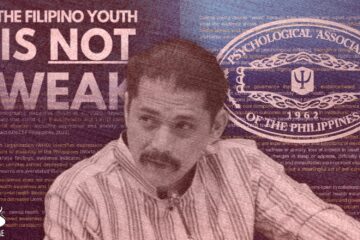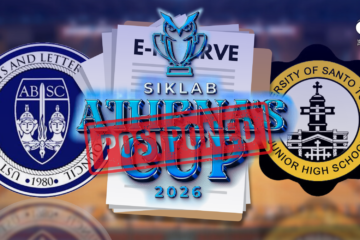
THE HEAD of the Manila Health Department has filed a cyber libel complaint against a labor leader over a social media video denouncing the city’s health permit requirement that allegedly contained “malicious allegations” that seek to “destroy” his reputation.
In a six-page complaint-affidavit, Manila Health Department Director Arnold “Poks” Pangan said he has sued National Federation of Labor vice president Elijah San Fernando over a TikTok video “insinuating” his involvement with corruption schemes and a syndicate operating against health services.
Pangan is also the husband of Manila Mayor and UST alumna Honey Lacuna.
“The statements made were false, have no factual basis, aimed to destroy my reputation as a person and as a public servant… Due to these malicious imputations, I suffered, and continue to suffer serious anxiety, besmirched reputation, mental anguish, sleepless nights, not to mention the damage they have caused my reputation and honor,” Pangan’s complaint against San Fernando, a copy of which was obtained by The Flame, read.
In the video posted on Aug. 6, San Fernando questioned the provision of Ordinance 8793 that directs all employees working in the capital city to obtain a health permit exclusively from the Manila Health Department.
“May dumating sa akin na balita. Totoo ba na asawa ni Mayor Lacuna ang kumikita sa mga health facility na ‘to na pinagkukunan ng health permit? Mayor, nagtatanong ako ha? Kasi usap-usapan at kumakalat na yan sa mga taga-Manila,” a transcript of San Fernando’s video cited in the complaint read.
(I heard some news. Is it true that Mayor Lacuna’s husband is profiting from these health facilities that issue health permits? Mayor, I’m just asking, okay? Because it’s being talked about and spreading among the people of Manila.)
Pangan said San Fernando did not mention his name in the video but he was made “clearly identifiable as husband of the Mayor of the City of Manila.”
“I therefore plead that Elijah San Fernando be made to pay the damages I suffered,” the city health officer said.
Pangan argued that the case contains elements of a cyber libel, namely the allegation of a discreditable act or condition concerning another; publication of the charge identity of the person defamed; and existence of malice.
“As relayed by counsel, the above elements are all present in this case. A malicious allegation insinuating that I am receiving/earning from the health facilities as ‘asawa ni (spouse of) Mayor Lacuna,’” Pangan said.
“Further, there were statements made insinuating that I am a part of a syndicate operating against basic health services, viz: ‘T****** kasing mga pulitiko’t sindikato ‘to walang pinapatawad! Kalusugan, edukasyon, lahat na pinagkakakitaan! (These politicians and syndicates are sons of b*****! They did not spare anything. They profit even from health and education),’” he added.
Concerns on the ordinance mounted after UST released a memorandum in April requiring all its employees to pay P625 to obtain a health certificate that must be renewed annually from the city government’s public health laboratory. Several employees have described the policy as “illogical” and “exploitative.” Non-tenured UST faculty members were barred from teaching during the first term due to non-compliance with the requirement.
In a press conference late last month, Lacuna blamed the UST administration’s alleged failure to properly inform its workers about the health permit policy for the criticisms against the requirement.
Pangan requested the Department of Justice National Prosecution Service to conduct a preliminary investigation starting Tuesday, Sept. 10, citing Republic Act 10175 or the Cybercrime Prevention Act of 2012 that San Fernando supposedly violated.
Under Section 4 of the law, the unlawful or prohibited acts of libel as defined in Article 355 of the Revised Penal Code are “public and malicious imputation of a crime, or of a vice or defect, real or imaginary, or any act, omission, condition, status, or circumstance tending to cause the dishonor, discredit, or contempt of a natural or juridical person, or to blacken the memory of one who is dead.”
San Fernando: Case is weak
Sought for comment, San Fernando said the claims in his video were not meant to tarnish Pangan’s reputation but to question the ordinance’s provision and to verify the information he obtained from other workers.
“The Constitution itself states that public office is a public trust. Public officials must be accountable to the people… So, when you are exercising your freedom to express and freedom to speak against a public official, whoever they may be, it won’t hold up as libel or cyber libel,” San Fernando told The Flame.
“All of them (employees) have the same sentiment that the Manila health permit is a burden and a hardship. Now, upon further investigation, the workers themselves from the Manila city office are saying that it’s widely known… The issue in the Manila city office is that someone is making profits from this kind of scheme in the Manila city office… So, we question that,” he added.
In his video, San Fernando claimed that 1,400 teachers and faculty members were not allowed to teach in UST because of a “weird” ordinance. Its implementation is also being forced upon the University, he added.
However, the figure was not attributed to any source. The video was also posted a day after Pangan issued a memorandum clarifying that all Manila-based schools are required to follow the health permit policy and not just UST, an information not specified in San Fernando’s video.
The labor leader said he is planning to attend the Sept. 10 hearing and is preparing a counter-affidavit against Pangan. He added that the case was an attempt to “scare” and “silence” critics.
“We will face the case… I haven’t named anyone. That’s why the case filed against me is weak. The main objective is to silence critics, silence the workers, so they won’t question the public officials,” San Fernando said.
Under the Revised Penal Code, libel is punishable by prisión correccional in its minimum (imprisonment that lasts from six months and one day to two years and four months) and medium periods (two years, four months and one day to four years) or a fine ranging from P40,000 to P1.2 million, or both, in addition to the civil action which may be brought by the offended party.



